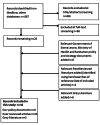Unsalaried health workers in Sierra Leone: a scoping review of the literature to establish their impact on healthcare delivery
- PMID: 38066622
- PMCID: PMC10709924
- DOI: 10.1186/s12939-023-02066-3
Unsalaried health workers in Sierra Leone: a scoping review of the literature to establish their impact on healthcare delivery
Abstract
Background: The World Health Organisation (WHO) estimates a 10 million health worker shortage by 2030. Despite this shortage, some low-income African countries paradoxically struggle with health worker surpluses. Technically, these health workers are needed to meet the minimum health worker-population ratio, but insufficient job opportunities in the public and private sector leaves available health workers unemployed. This results in emigration and un- or underemployment, as few countries have policies or plans in place to absorb this excess capacity. Sierra Leone, Liberia and Guinea have taken a different approach; health authorities and/or public hospitals 'recruit' medical and nursing graduates on an unsalaried basis, promising eventual paid public employment. 50% Sierra Leone's health workforce is currently unsalaried. This scoping review examines the existing evidence on Sierra Leone's unsalaried health workers (UHWs) to establish what impact they have on the equitable delivery of care.
Methods: A scoping review was conducted using Joanna Briggs Institute guidance. Medline, PubMed, Scopus, Web of Science were searched to identify relevant literature. Grey literature (reports) and Ministry of Health and Sanitation policy documents were also included.
Results: 36 texts, containing UHW related data, met the inclusion criteria. The findings divide into two categories and nine sub-categories: Charging for care and medicines that should be free; Trust and mistrust; Accountability; Informal provision of care, Private practice and lack of regulation. Over-production of health workers; UHW issues within policy and strategy; Lack of personnel data undermines MoHS planning; Health sector finance.
Conclusion: Sierra Leone's example demonstrates that UHWs undermine equitable access to healthcare, if they resort to employing a range of coping strategies to survive financially, which some do. Their impact is wide ranging and will undermine Sierra Leone's efforts to achieve Universal Health Coverage if unaddressed. These findings are relevant to other LICs with similar health worker surpluses.
Keywords: Access to Healthcare; Health systems; Healthcare Financing; Sierra Leone; Universal Health Coverage; Unsalaried Health workers.
© 2023. The Author(s).
Conflict of interest statement
The authors declare no competing interests.
Figures
Similar articles
-
Employed but Unpaid, Volunteers or Paradoxical Surplus? Sierra Leone's Unsalaried Health Workforce.Int J Health Plann Manage. 2025 Aug 8. doi: 10.1002/hpm.70016. Online ahead of print. Int J Health Plann Manage. 2025. PMID: 40778790
-
"If I had known, I would have applied": poor communication, job dissatisfaction, and attrition of rural health workers in Sierra Leone.Hum Resour Health. 2018 Sep 24;16(1):50. doi: 10.1186/s12960-018-0311-y. Hum Resour Health. 2018. PMID: 30249253 Free PMC article.
-
When free healthcare is not free. Corruption and mistrust in Sierra Leone's primary healthcare system immediately prior to the Ebola outbreak.Int Health. 2015 Nov;7(6):400-4. doi: 10.1093/inthealth/ihv024. Epub 2015 Apr 23. Int Health. 2015. PMID: 25908714
-
Public health system in post-pandemic Sierra Leone: a scoping review.BMC Infect Dis. 2024 Dec 21;24(1):1453. doi: 10.1186/s12879-024-10360-w. BMC Infect Dis. 2024. PMID: 39709377 Free PMC article.
-
Indirect Effects of Ebola Virus Disease Epidemics on Health Systems in the Democratic Republic of the Congo, Guinea, Sierra Leone and Liberia: A Scoping Review Supplemented with Expert Interviews.Int J Environ Res Public Health. 2022 Oct 12;19(20):13113. doi: 10.3390/ijerph192013113. Int J Environ Res Public Health. 2022. PMID: 36293703 Free PMC article.
Cited by
-
Ballpark Estimates of Budget Space for Health Workforce Investments in the 47 Countries of the WHO African Region: A Modelling Study.Health Serv Insights. 2025 Feb 15;18:11786329251320429. doi: 10.1177/11786329251320429. eCollection 2025. Health Serv Insights. 2025. PMID: 39959140 Free PMC article.
-
Projected health workforce requirements and shortage for addressing the disease burden in the WHO Africa Region, 2022-2030: a needs-based modelling study.BMJ Glob Health. 2024 Oct 22;7(Suppl 1):e015972. doi: 10.1136/bmjgh-2024-015972. BMJ Glob Health. 2024. PMID: 39438055 Free PMC article.
References
-
- Yeates N, Pillinger J. International health worker migration and recruitment: global governance, politics and policy. London and New York: Routledge; 2019.
Publication types
MeSH terms
Grants and funding
LinkOut - more resources
Full Text Sources
Medical
Miscellaneous


